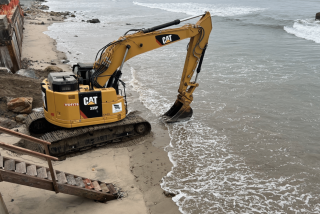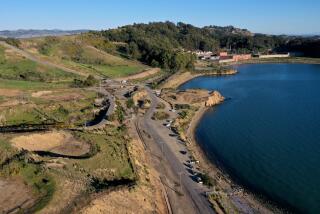Billionaire broke law by barring access to Martin’s Beach, judge rules
- Share via
In a closely watched beach-access case, a San Mateo County judge ruled tentatively Wednesday that a Silicon Valley venture capitalist violated the California Coastal Act by denying public access across his property to a popular spot near Half Moon Bay.
Superior Court Judge Barbara Mallach ruled that by padlocking a gate, hiring security guards and altering signs without state permission, Vinod Khosla had wrongly denied public access to Martin’s Beach, granting a legal victory to the nonprofit Surfrider Foundation, which brought suit.
------------
FOR THE RECORD:
Martin’s Beach: An article in the Sept. 25 LATExtra section about a judge’s ruling on public access to Martin’s Beach in San Mateo County misspelled the last name of UC Hastings law professor John Leshy as Teshy.
------------
Mallach also found that Khosla, a co-founder of Sun Microsystems, had acted in good faith, and denied the plaintiffs’ request that he be fined up to $20 million.
“Today’s decision is a huge victory for all of the people of California. Everyone can again visit Martin’s Beach,” said Joe Cotchett, an attorney for the Surfrider Foundation.
Dori Yob, a lawyer for Khosla, said in an email: “We are disappointed with the court’s decision and will consider our options for appealing the ruling.”
The case has raised questions of whether a private property owner can be compelled to provide public beach access just because his predecessor did, and whether the California Coastal Commission is within constitutional bounds when it negotiates for such access in exchange for coastal development permits.
The order by Mallach means that Khosla must immediately “cease preventing public access to the coast,” said Angela Howe, legal director for the Surfrider Foundation.
The case resonated with some people because it reflected fears that tech billionaires were buying up coastal properties with the intention of keeping others out.
“This is a battle of David versus Goliath,” Cotchett said, “between the people who want to use the beaches and the wealthy who want it for their own private purposes.”
John Teshy of UC Hastings law school said the case raised the issue of a “wealth divide.”
“It’s the issue of the growing gap between the very wealthy versus everyone else, and this sort of captures it in a snapshot,” Teshy said. “High-tech billionaires are kind of gods in California, and it has that framework to make it all very interesting and newsworthy, but in terms of law, you have to get down to the particular facts.”
For decades, Martin’s Beach was visited by thousands of locals who picnicked, surfed and fished in its protective cove.
The previous owners granted beachgoers their only way to the beach by land, via a dirt road, and charged a small fee for parking. But in 2010, two years after Khosla acquired the property, his manager locked the gate, painted over a sign that had beckoned from California Highway 1 and posted security guards to ward off trespassers.
Khosla did so despite being told by county planning officials, the Coastal Commission and a different San Mateo County Superior Court in 2009 that he needed to seek a coastal development permit if any of his actions were to change the “intensity of use” of the water or access to it.
Howe, legal director for the Surfrider Foundation, said Wednesday’s ruling was significant because it reaffirmed another legal ruling in stating that “development” applies to not just the alteration of physical structures on a property but to its past “intensity of use.”
Teshy, who had not yet read the ruling, said that past use of the land probably would be considered should Khosla appeal, and added that the case is just “another step” in the issue of public beach access versus property rights.
“Whatever the landowner’s rights were or are, his predecessor in title let the surfers cross the land, and it could be relevant because whatever rights he did have at one point, could they be considered abandoned or waived by the previous practices of letting surfers cross the land?” Teshy said.
The Surfrider Foundation sued last year on narrow grounds, contending that Khosla intentionally flouted the administrative process. The foundation was asking that Khosla, who is known for his alternative energy investments, be fined the maximum of $15,000 a day dating to the October 2010 gate closure — an amount that would total about $20 million.
Khosla’s attorney, Jeffrey Essner, had argued that he did not engage in “development” that required a permit, despite contrary opinions from local and state officials.
The gate that Khosla closed predated the Coastal Act of 1976, Essner said, and was locked and unlocked at the previous owner’s discretion. Nothing in the law pointed to the existence or elimination of signage or guards as development, he had said.
Gov. Jerry Brown has until Tuesday to sign or veto a bill by state Sen. Jerry Hill (D-San Mateo) that would ask the State Lands Commission — which has eminent domain power — to negotiate beach access with Khosla.
[email protected]
Twitter: @amcovarrubias
Times staff writer Lee Romney contributed to this report.
More to Read
Sign up for Essential California
The most important California stories and recommendations in your inbox every morning.
You may occasionally receive promotional content from the Los Angeles Times.











